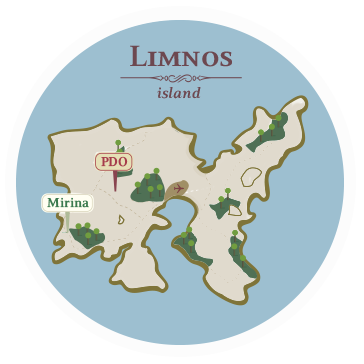Grapevines are non-irrigated and farmed organically (using natural fertilizers, such as seaweed mulch). Trunk training pursues cup-shaped forms, while trunks are aged more than three years past their vaccination. No irrigation is allowed and the same goes for any non-traditional farming techniques. Grapevines are planted with a density of approximately 350 to 450 plants per 0,001 Km2, growing with a cup-shaped form at a distance of 40-45 centimeters from the soil, so they can remain unaffected by the island’s strong winds and yet maintain their proper aeration. The vineyard’s yield of dry white Muscat of Alexandria is 700-900 Kg per 0,001 Km2 in vineyards aged 15-20 years, while average yield is approximately 600 Kg per 0,001 Km2 in vineyards aged 20-25 years.
Vineyards are carefully harvested by hand during the first morning hours, and they are placed in a special packaging during the harvest in order to avoid crushing the grape and to keep them free from developing any molds.
Naturally Sweet wines are produced from vineyards aged 50 years or more, with a low yield of 400 Kg per 0,001 Km2, situated at an altitude of 300 meters in the locations of Kokinogia and Perdikou of the western part of the island.
The harvesting process for producing the dessert wine from Muscat of Alexandria – the wine called “Liasto” – is a special process at 14 degrees Baumé (alcoholic strength of 14.7): For 7 days, selected grapes are manually placed under the hot sun, exposed to high temperatures, in order for the grape to dehydrate and reach 19 degrees Baumé. The wine’s alcohol level is 14.5% and its sugar content is 99%.





